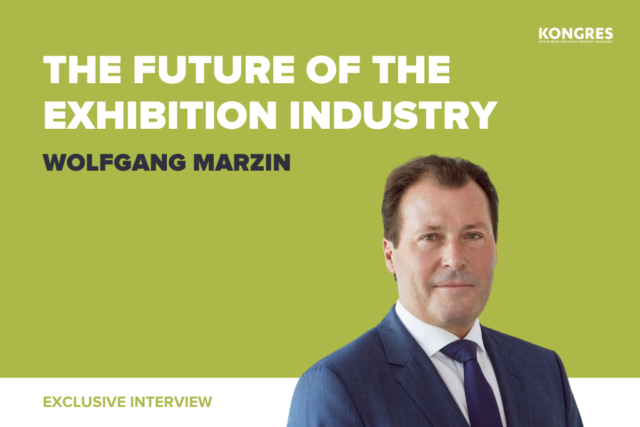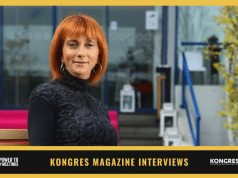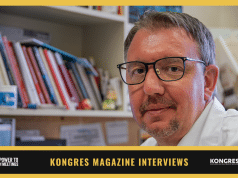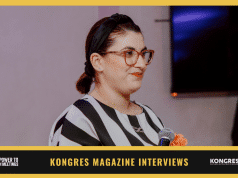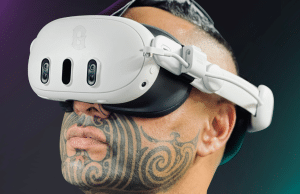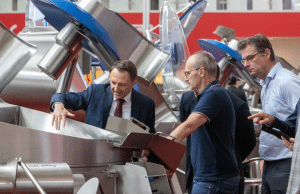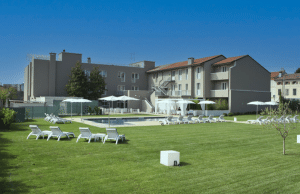“The Corona crisis has certainly highlighted the economic importance of our events”
Q: How do you personally perceive the cancellation of trade shows?
At Messe Frankfurt, we organise leading international trade fairs that are among the most important meeting places for our customers. Cancellation is not only associated with a lot of effort and high losses for us as trade fair organisers, it also means that our customers miss out on exchanges with business partners at an international level. The economic effects are devastating because trade fairs are among the most powerful engines of the economy – not least in times of global crises. That is why we are glad that we have succeeded in finding timely alternative dates for the vast majority of our trade fairs.
Q: How has your company adapted to the new normal?
We were already well-positioned at the beginning of the Corona pandemic, but we had to learn that in view of the still volatile situation it is often only possible to plan “on sight”. Until we are allowed to organise our physical fairs again as usual, we offer our customers digital formats to stay in touch and to pursue their order activities. The majority of Messe Frankfurt’s approximately 2,500 employees work from their home offices – and have been doing so for almost a year. Our many years of digital expertise are benefiting us in the current time: the transfer to the home office went smoothly, and the Day-to-Day has also settled in quickly. Nevertheless, we cannot wait to be back on site. We feel the same as most other people in the world: no one wants to sit at home permanently and only communicate via video or telephone conference – face-to-face meetings remain irreplaceable.
Q: Is it possible to use the exhibition spaces for other purposes when there are no trade shows or events?
For months now, the exhibition grounds have been used for numerous events that are not directly related to our trade fairs. For example, the qualifying race for the 2020 Half Marathon World Championships took place on our outdoor areas. The University of Applied Science in Frankfurt also regularly uses our halls as a location for the exams of students from various disciplines, in order to be able to comply with hygiene standards and safety distances. Since December 2020, our Festhalle has also been used as a vaccination centre, where up to 4,000 people can be vaccinated against the Coronavirus every day.
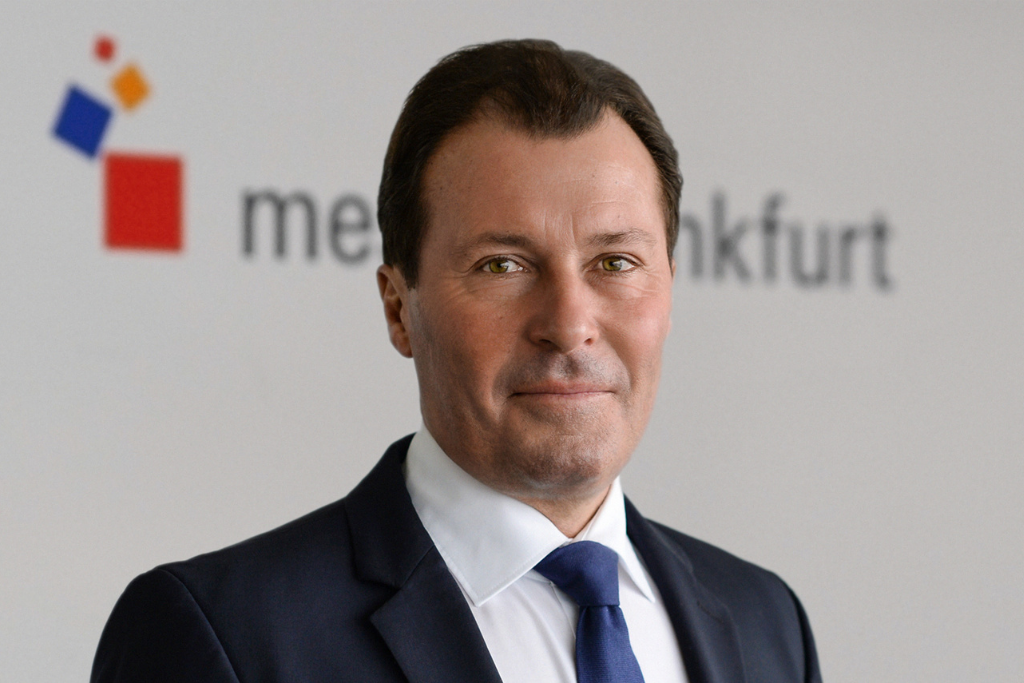
Q: What trade shows are you planning for this year, given that the epidemiological situation will be favourable?
Our first show in 2021 was the regionally oriented Beautyworld Japan Fukuoka trade fair along with the Texworld Evolution Showroom in Paris at the beginning of February. In addition, Asiamold and SIAF in Guangzhou were successfully held at the beginning of March. In Germany, we will start with ISH Digital in mid-March and are planning our first physical trade fair of the year at the Frankfurt venue in June: IndoorAir. This will be followed in July by the first edition of Frankfurt Fashion Week with our sustainable fashion event, Neonyt. Other events planned for the second half of the year include Automechanika Frankfurt, Hypermotion, Cleanzone, Formnext, Texcare International and many more. In addition, there are numerous events planned at our international locations.
Q: Trade shows have incredible multiplicative effects. Is the general public or government currently aware of these effects?
The Corona crisis has certainly highlighted the economic importance of our events for many people. Sectors such as gastronomy, hotels or even the transport sector are feeling the lack of sales that are otherwise generated by participants of our events. In 2018, a study by the renowned German market research institute ifo revealed that Messe Frankfurt events generate € 3.6 billion in purchasing power in Germany each year – half of which is generated in Frankfurt alone. The study further revealed that events thus secure more than 33,000 jobs and generate tax revenue of more than € 650 million nationwide. These figures underline the significant contribution that trade fairs can make to the recovery of the economy as soon as face-to-face encounters are possible again internationally.
Q: Does the government help you overcome the crisis, and how?
At Messe Frankfurt, we are endeavouring to overcome this crisis as far as possible under our own steam. We are helped in this by an economically strong 2019 as well as the preceding healthy event years with steady sales growth for many years. Other tools for securing our liquidity include cost savings and investments in securing the future of our business model. We are in regular exchange with our shareholders – 60 per cent City of Frankfurt and 40 per cent State of Hesse – and inform them about the current and future liquidity situation of the MF Group. Within this framework, we also discuss, if necessary, in what form our shareholders can support us. Messe Frankfurt has been using short-time working since the end of April 2020. In this way, we are relieving the company economically. We are taking a sighted approach and will see how long we have to maintain short-time working.
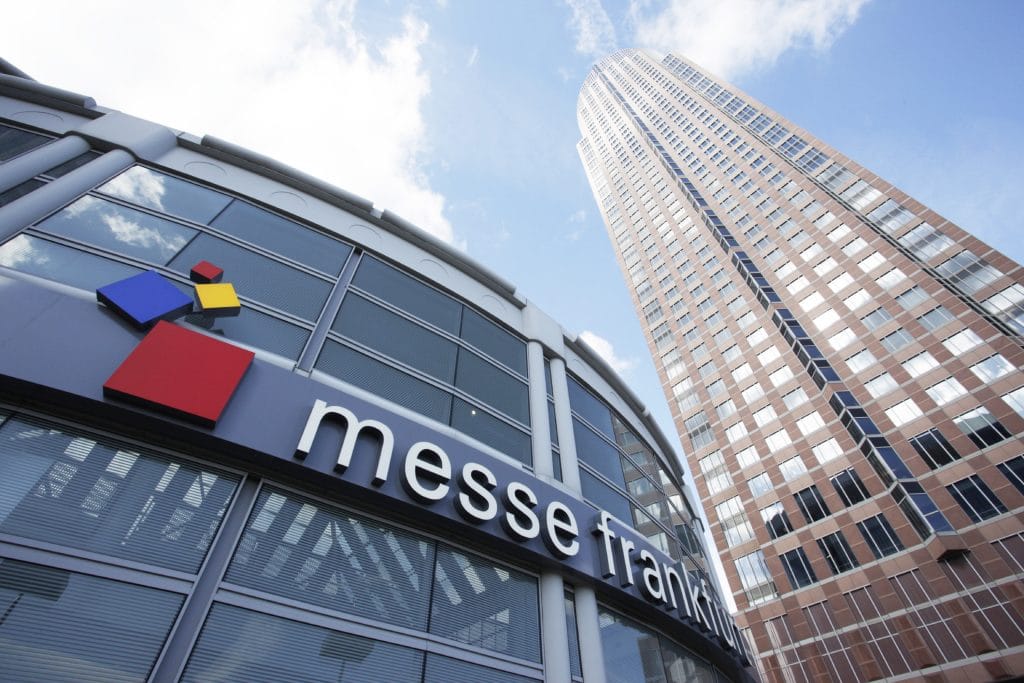
“Digital offers cannot replace a physical trade fair”
Q: Can you give our readers your perspective on the exhibition sector in the global market?
The event industry and with it many sectors are still in a very difficult situation. The pandemic situation remains serious, ongoing travel restrictions and security regulations to protect against the virus are reducing reliable trade fair planning. There is uncertainty among trade fair participants regarding presence and customer contacts. Many of our worldwide events have to be held in digital format. Fortunately, this does not apply to all parts of the world: In China, our trade fairs can continue to take place as presence events, with a large number of exhibitors and visitors. In Japan, too, the first regional events have taken place again. We all very much hope that the vaccination campaigns that have started and the current restrictions will serve their purpose as soon as possible and that we will increasingly be able to organise physical fairs or hybrid events again in the course of the year.
Q: Are virtual trade shows comparable to classic trade shows?
Digital offers cannot replace a physical trade fair, because sustainable business relationships are based on personal contacts – this applies to all trade fair formats. Our trade fairs often involve considerable financial volumes, for which a good business relationship and mutual trust are necessary. This can only be achieved in face-to-face conversations. Furthermore, the sensual experience plays a central role in the selection of products, which can only be inadequately conveyed by virtual presentations. Our customers want to experience the products live and check their quality. They want to enter into a personal dialogue with the manufacturer in order to jointly plan strategies for marketing them. Therefore, I am firmly convinced that trade fairs will remain essential for the global economy as a platform for exchange within their industries and communities and may even gain in importance.
Q: How have you adapted to the new reality of the meetings industry, which is much more digital and hybrid?
Messe Frankfurt has been investing in digitisation at its events for two decades. We offer our customers a versatile package of digital formats, which have now been strengthened by the digitalisation push. This factor will also be an integral part of our physical events after Corona and a valuable enrichment, before, during and after the fair. With complementary supplementary formats, digital or/and hybrid, we bring additional and very different added values to our trade fairs. For example, through AI-supported networking, matchmaking, in other words, all opportunities for our customers to present themselves additionally, to establish contacts, to increase reach and networking throughout the year and to increase the efficiency of investments. However, the personal encounter is and remains the be-all and end-all of a trade fair event.
Q: Who could be hired at this moment at your company? What would they have to showcase at the job interview?
In addition to professional suitability, we have always considered innovative strength, flexibility and enthusiasm with regard to organisation and dealing with people to be essential success factors for everyday working life and basic prerequisites for successful applications.
EXTRA QUESTION FOR WOLFGANG
Q: High Tech or High Touch?
For trade fairs, it’s all in the mix! Events of all kinds live on emotions, on personal encounters and experiences. In a business setting, personal conversations form the basis for lasting relationships. During our events, trade fair participants can make new contacts, find out about trends and experience products with all their senses.
At the same time, we rely on future-proof technologies in many areas to further develop our physical events. This applies, for example, to logistics on the exhibition grounds, participant management or the provision of information. Our exhibitors also use our digital platforms to present themselves to their customers beyond the duration of the fair. A real high-tech hub is created at Messe Frankfurt, especially during our events, because this is where the real professionals have their say – start-ups and global players present forward-looking solutions at our trade fairs and provide cross-sector impulses.


